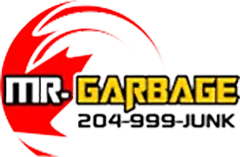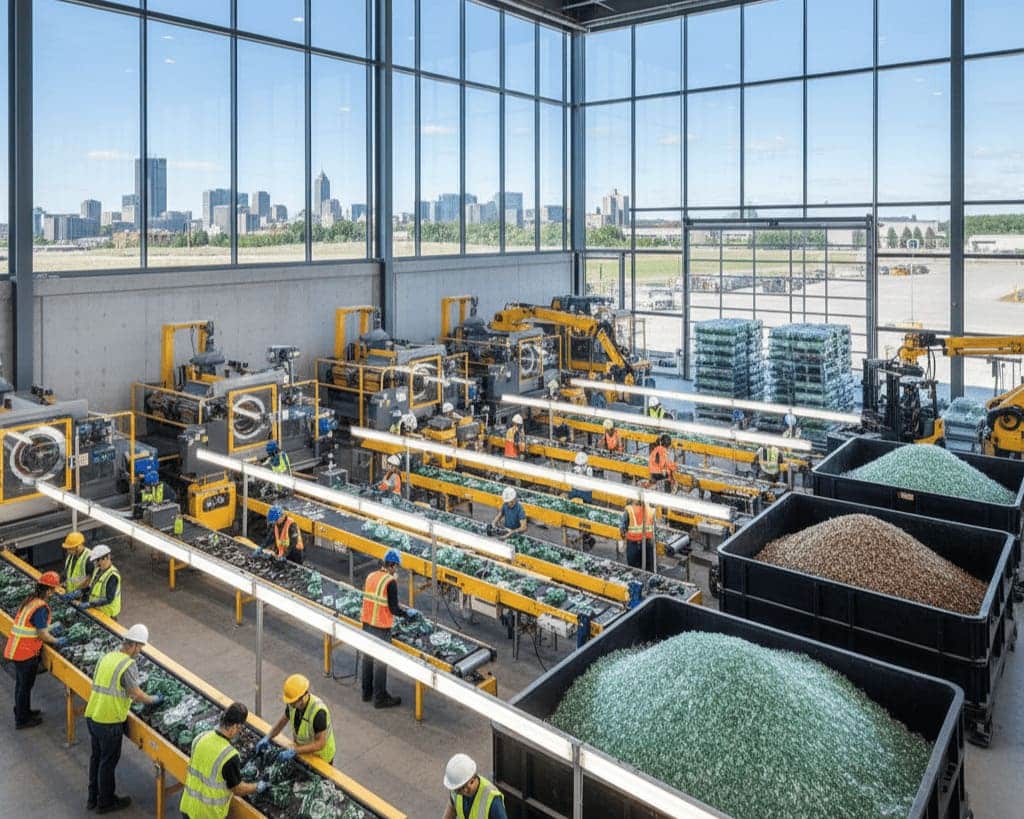Businesses, property managers, and institutions generate a significant amount of recyclable materials. The right commercial recycling programs keep useful material out of landfills, reduce operational headaches, and support local circular markets. This guide explains how commercial recycling programs in Winnipeg operate, what materials and containers to consider, how stewardship and municipal options fit together, and practical steps your business can use today. I’ll include local references, a credible Canadian context, a real-world example, and explain how
Mr. Garbage can simplify running commercial recycling.
How the system is organized
Commercial recycling in Winnipeg is a mix of municipal services, stewardship programs, and private collectors. The City of Winnipeg operates 4R depots and provides guidance for businesses and registered charities to access certain depot services. For specialty streams like electronics, batteries, paint, and certain packaging, producer-funded stewardship programs and private partners fill in the gaps. Understanding these layers is the first step to building a dependable program for your business.
Key players you’ll meet.
- Municipal depots and drop-off services.
- Stewardship programs that manage regulated materials (for example, electronics).
- Private haulers and processors that service commercial accounts.
This hybrid model works because different materials need different handling; cardboard and paper are bulky but straightforward, while electronics, lighting, and hazardous items require certified processors.
What materials are typically covered by commercial recycling programs
Commercial recycling programs target streams that are common to businesses and institutions. Typical streams include:
Paper, cardboard, and packaging
Office paper, mixed paper, corrugated cardboard, and boxboard are core commercial streams. Many businesses produce large volumes of flattened cardboard and loose paper that are prime for recycling. Municipal depots accept overflow from households, and private haulers offer scheduled pickups and larger containers for steady streams. Proper flattening and contamination control (no food or plastic film) are the simplest ways to keep paper streams valuable.
City of WinnipegContainers and industrial packaging
Plastics, metal cans, and rigid plastics from retail and food-service operations are commonly collected. Some packaging types are covered by provincial or producer stewardship programs—check product stewardship guidance and your hauler’s accepted-materials list. Keeping containers clean and separate increases the chance they’ll be processed into new products.
Government of ManitobaOrganics and composting
Food-service businesses and grocery stores often benefit from organic diversion. Commercial organics programs and private organics haulers handle food scraps and compostable packaging. When organics are kept separate and contamination (like plastics) is minimized, processors can turn that material into soil products or energy. Municipal guidance and private processors detail acceptable inputs and best-practice sorting.
CanadaElectronics and specialty streams
Electronic products and some electrical components are collected through regulated programs like Recycle My Electronics (EPRA). These stewardship programs ensure electronics are handled by certified processors and not exported improperly. If your business generates old monitors, printers, or small electronics, use approved drop-off locations or arrange a commercial pickup through certified collectors.
Recycle My ElectronicsWhy commercial recycling programs matter
Canada’s recent reporting shows steady progress in diversion, but there’s still room to improve. National data finds that diverted waste has grown while overall waste generation has increased, underscoring the importance of organized recycling at scale. For Winnipeg businesses, better commercial recycling reduces landfill pressure and supports local recycling markets that need steady, clean material streams.
CanadaExpert perspective: “Reliable, source-separated commercial streams are the backbone of effective recycling,” says a regional waste consultant. “When businesses keep streams clean and consistent, processors can make higher-quality recycled products, and the local market benefits.” (Paraphrased, industry view.)
How to set up commercial recycling programs at your business
A short, practical roadmap helps you go from idea to habit.
Step 1: Audit and map your waste
Start by tracking what you throw away for a short period. Note volumes of cardboard, paper, organics, electronics, and non-recyclables. An audit clarifies which streams would most benefit from diversion and what container sizes you’ll need.
Step 2: Choose containers and pickup frequency
Select containers that match the material and traffic flow: front-load bins for high-volume cardboard, smaller lockable bins for confidential paper, and organics carts for food-service areas. Coordinate pickup frequency so bins don’t overflow; many commercial haulers offer customizable schedules and bin sizes.
Step 3: Train staff and label clearly
Clear signage and short staff training beat fancy equipment. Teach employees which items go where, show how to flatten boxes, and where to keep contamination out. Use simple, consistent labels and station design, and people follow clear signals.
Sep 4: Monitor, report, and improve
Track service invoices and diversion volumes where possible. Small adjustments — a new bin placement, a short retraining, or a one-week focused audit — can increase capture rates and reduce contamination over time.
Mr. Garbage can simplify steps two and three by supplying commercial recycling bins, scheduling pickups, and providing on-site guidance to make sure sorting and routing follow local processor rules.
Mr. GarbageLegal and stewardship requirements businesses should know
Businesses must follow municipal rules for hazardous materials and regulated products. For example, small businesses and registered charities can access certain depot services under City of Winnipeg programs, but regulated items such as electronics should go through approved stewardship channels. Using certified processors and documented pickups helps ensure compliance and avoids risky disposal pathways.
City of WinnipegTip: Keep documentation for special or large-item pickups, environmental audits, and lease agreements sometimes request proof that materials were handled responsibly.
What commercial recycling bins to consider
The right container depends on the material and the site.
Common commercial bin types
- Front-load carts and bins: good for restaurants and retail back-of-house cardboard and containers.
- Compactors: useful where compacting cardboard or mixed containers reduces transport frequency.
- Lockable confidential paper bins: for offices that handle sensitive documents before shredding and recycling.
- Organics carts: for food-service and grocery backrooms to capture food scraps and compostable packaging.
A reliable hauler will advise on sizes and placements that fit operations and worker flows. Mr. Garbage provides a range of commercial recycling containers and handles routing to approved processors.
Mr. GarbageThe common enemy of commercial recycling programs
Contamination (food, plastics in paper streams, film mixed in cardboard) degrades bale quality and sometimes forces entire loads to landfill. Simple rules prevent it:
- Keep food away from paper streams.
- Use dedicated organics carts for food scraps.
- Flatten cardboard and remove liners.
- Put film plastic in its designated route or backhaul program if available.
A short checklist posted at bin stations and a monthly visual audit cut contamination dramatically. Haulers will often provide feedback about recurring contamination so you can target training.
Case study: a Winnipeg café that made recycling work
A downtown Winnipeg café struggled with overflowing cardboard and mixed containers. They did a one-week audit, installed a clearly labelled cardboard bay near the loading area, and scheduled twice-weekly pickups. Staff followed a 5-minute training routine and used a simple “no liners in cardboard” rule. Within weeks, the café reduced overflow, and the hauler reported much cleaner loads. For larger or irregular cleanouts, the café now books a single pickup with Mr. Garbage to handle cardboard consolidation and route material to the appropriate recycling partner. This kind of small, practical change scales well across small businesses. (Example adapted from local program practice and operator reports.)
Mr. GarbageWorking with stewardship programs and specialty recyclers
Some materials are managed by producer or stewardship programs — electronics (EPRA / Recycle My Electronics), batteries (Call2Recycle), and certain packaging. These programs maintain authorized drop-off networks and certified processors. For businesses with specialty streams, verify that your collector uses approved processors and follow the stewardship program guidance for segregation and documentation.
Recycle My ElectronicsWhy choose a commercial recycling partner like Mr. Garbage
Outsourcing commercial recycling to a trusted partner reduces complexity. Mr. Garbage offers:
- Flexible bin rentals and scheduled pickups.
- Knowledge of local depot rules and stewardship programs.
- On-site guidance and training for staff to reduce contamination.
- Documented routing and proof-of-recycling where required.
When businesses scale up, having a single point of contact who understands Winnipeg routes and provincial stewardship programs saves time and improves diversion outcomes.
Simple KPIs for commercial recycling programs
Track a few practical indicators:
- Volume of diverted material (bins collected, trips avoided).
- Contamination rate (observed in spot checks).
- Pickup reliability and missed-service incidents.
- Staff compliance after training sessions.
These simple metrics help you adjust frequency, container types, and training to improve program performance without heavy administration.
Commercial recycling’s role in the local circular economy
Commercial recycling supplies processors with consistent material streams that feed local manufacturers and remanufacturers. When businesses keep streams clean, processors can produce higher-quality recycled materials, which strengthens local markets and reduces pressure on landfills. Using municipal depots, stewardship networks, and certified private processors together creates a resilient local recycling system, and businesses that participate help keep Winnipeg’s circular economy moving. National statistics show diversion is improving, but consistent, clean commercial streams remain critical to continued progress.
Conclusion
Commercial recycling programs are practical and achievable for Winnipeg businesses when you build a clear plan: audit your waste, choose the right containers, train staff, and work with certified processors for specialty streams. Municipal depots, stewardship programs, and private haulers each play a role, and a local partner like Mr. Garbage can simplify the logistics, provide the right
commercial recycling bins, and ensure materials are routed correctly and documented.
Ready to set up or improve your commercial recycling program in Winnipeg? Contact
Mr. Garbage to schedule a site audit, choose the right commercial recycling containers, and set up reliable pickups that keep your business compliant and materials circulating in the local economy.
Frequently Asked Questions (FAQs)
Q1: What are commercial recycling programs, and who runs them?
A1: Commercial recycling programs are coordinated collection and processing systems for business-generated recyclable materials. They include municipal depot options, producer stewardship programs for regulated materials (like electronics), and private haulers who offer scheduled pickups and containers.
Q2: What types of commercial recycling bins should my business use?
A2: Common choices include front-load bins for cardboard and containers, lockable confidential-paper bins, organics carts for food-service operations, and compactors for large-volume cardboard. Choose containers based on volume, space, and material type.
Q3: How can I reduce contamination in my commercial recycling program?
A3: Train staff with clear signage, keep food and organics out of paper streams, flatten boxes, and run simple monthly spot checks. Your hauler can often provide contamination feedback to guide targeted training.
Q4: Does my business need to use steward-approved processors for electronics?
A4: Yes. Electronics and some specialty materials are covered by stewardship programs that require certified processors. Use EPRA’s Recycle My Electronics network or an approved commercial collector to ensure compliant handling.
Q5: How can Mr. Garbage help with commercial recycling programs?
A5: Mr. Garbage supplies commercial recycling bins, schedules pickups to match your needs, offers on-site guidance to reduce contamination, and coordinates routing to approved processors and depots. They simplify logistics and documentation for busy businesses.

